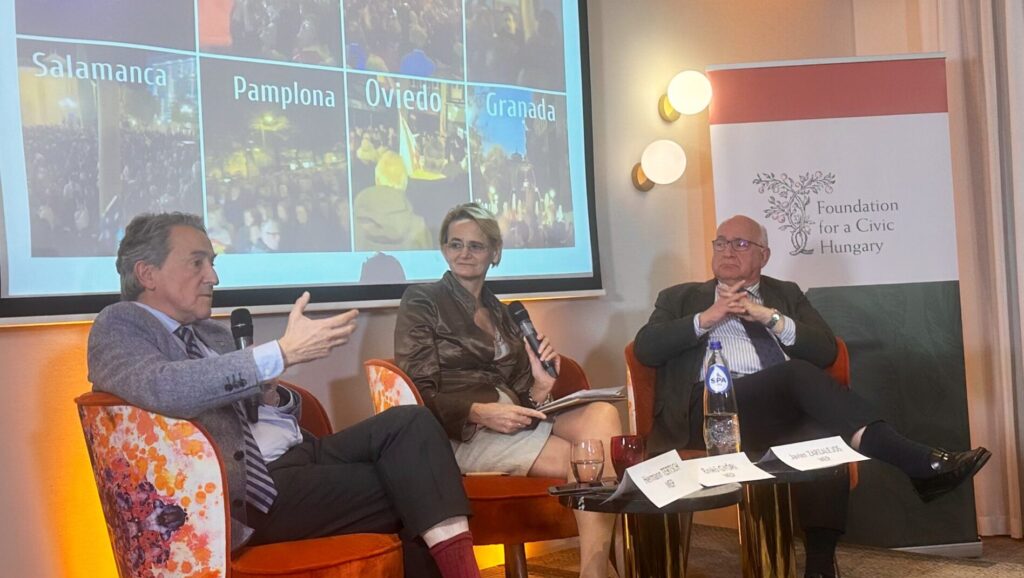
Left to right: MEPs Hermann Tertsch, Enikő Győri, and Javier Zarzalejos
As Spain grapples with an unprecedented political crisis, Brussels still hasn’t decided where to stand. Apart from the major protests in every city, the country can do nothing but watch helplessly as the socialists get away with their ‘coup d’etat’ by forming a ‘Frankenstein’ coalition with criminals, disregarding everything the law—and even the constitution—stands for.
The EU institutions seem equally helpless, but for different reasons. Brussels has been so invested in its self-serving narrative that rule of law violations can only happen on one side of the political spectrum that when a socialist party moves against the law, their program crashes. The criminality of how the Sánchez government is clinging to power is obvious to the millions of Spaniards taking to the streets, but not for the rest of Europe. That is why raising awareness is so important, and as a common objective, it must bring everyone together on the Spanish Right.
A recent event in Brussels attempted to do just that. Organized by the Foundation for a Civic Hungary and moderated by Fidesz MEP Enikő Győri, Wednesday’s panel discussion dived into Spain’s political nightmare with two MEPs from opposing factions of the Spanish Right: Javier Zarzalejos (PP/EPP) and Hermann Tertsch (VOX/ECR).
“What is happening in Spain is easy to explain but very hard to understand,” Zarzalejos began, saying how difficult it is to grasp the essence of this unholy alliance between socialists and separatist nationalist forces—especially when Sánchez’ three main coalition partners are all led by people who have been convicted for terrorism and embezzlement of public funds or escaped Spanish justice after illegally declaring independence.
None of that matters for the socialists, who tweak the constitution as they see fit, even giving more power to the separatists in Catalonia and the Basque Country, only to see their government have another term at the helm of the country.
“It’s a coup d’etat in the sense that they are delegitimizing the whole political system and the constitutional order,” Tertsch added, calling it a complete “break-up of the country’s legal system,” with Madrid no longer having sovereignty in the separatist regions.
Both MEPs agreed that the current crisis did not start with the amnesty or even Catalonia’s unconstitutional referendum in 2017.
Instead, it began with former socialist Prime Minister José Luis Rodríguez Zapatero coming into government in 2004 with “a plan of a permanent coalition [between socialists and separatists] to expel conservatives from power forever,” Tertsch said. The Socialist Party’s (PSOE) grand strategy was interrupted by the financial crisis in 2008, but the right-wing government that followed failed to undo the damage Zapatero caused to the constitutional order during his term, so Sánchez could pick up the plan where he left it, taking it to the next level, as Zarzalejos explained.
“What we have now is exactly what Zapatero wanted.” Tertsch went on:
A permanent coalition that is anti-Spanish and anti-national. They prefer not to have a Spain but are very much in favor of having a divided nation where they can rule uncontested.
These mafia-style tactics are plucked from the textbooks of the South American far-Left, the MEPs agreed, as the PSOE has enormous Latin American communist connections, with only the tip of the iceberg having been publicly disclosed. But what’s happening now can be clearly described by the hundred-year-old communist motto, Tertsch added,
For Spain to be red, Spain needs to be broken.
Zarzalejos thinks the problem with the center-right all over Europe is that it puts too much trust in managing their countries and does not pay attention to the political games played beneath the surface. “We think that good economic policies are enough to win elections, but that’s not the case,” he said, as good management and political strategies are equally needed.
On the other side, Sánchez and the socialists are utterly incapable of keeping the country on a financially stable course, yet they have the power all the same. Even though the EU’s relaxed rules during COVID proved that the PSOE cannot be trusted with responsible governance at all, Zarzalejos remarked, adding that
telling a socialist government to spend as much as it wants is the equivalent of giving a loaded gun to a monkey.
Tertsch, however, focused more on what happened during the last elections, not hiding his frustration about the fact that, were it not for the Partido Popular’s anti-VOX campaign, the country might not be in this situation in the first place. Instead of criticizing Sánchez and the PSOE, the Partido Popular (PP) spent its campaign attacking VOX, the conservative party to the right of them.
“The problem is not that VOX is accused by the Left as fascists—it’s normal for the Left to do so whenever they want to shut someone down—but it was not normal for the PP to do it,” said the MEP. “[The PP] thought they could have a majority and a government alone, so they started a campaign to kill VOX and bring in its votes.”
The Spanish regional elections earlier this year showed that a PP-VOX alliance could not only work but bring serious results—it’s a pity the same wasn’t replicated during the general elections. The current crisis, however, might prompt both parties to forget their differences and prepare their resistance together. The fact that this event could have happened is a good start to begin with.
Furthermore, the Spanish Right needs to unite not only for the sake of Spain but for conservatives all across Europe. Socialist governments have been given a green pass for too long, while conservatives are scrutinized for the smallest of things. “The rule of law is a very selective thing in Brussels,” Győri lamented. “Hopefully the PP [as a member of the more influential EPP] will help us make the playing field level once again.”
